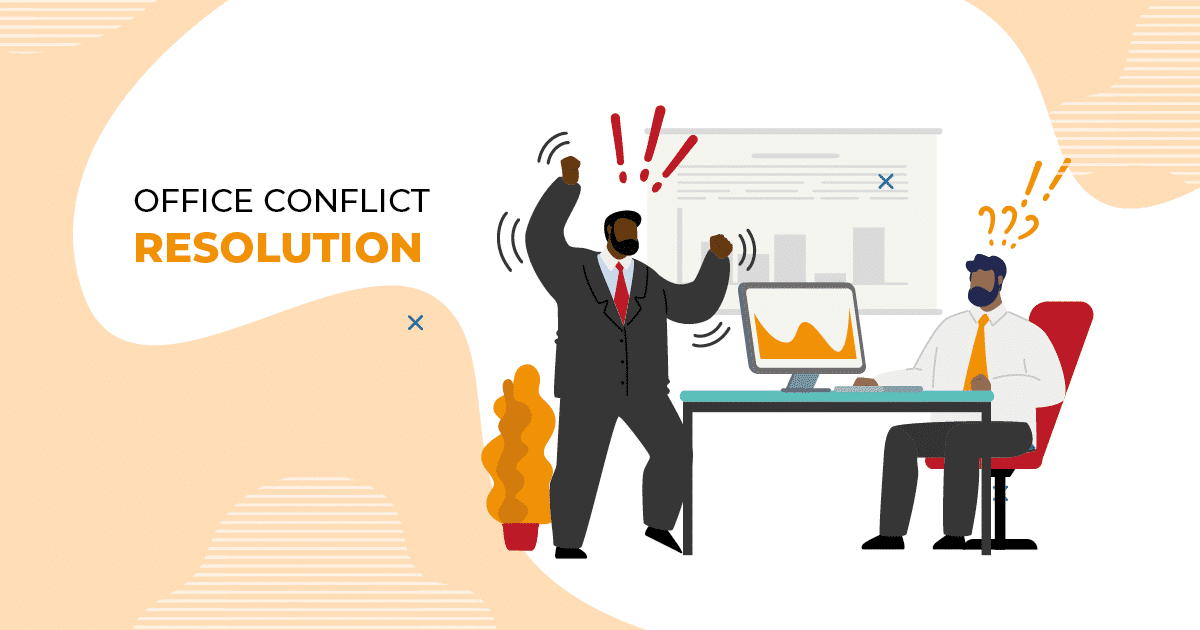Office conflict resolution is possible only if the sources of conflict are known and understood. Office conflict is simply a form of resistance that results from authentic or perceived differences in opinions and ideas. Interestingly, ideas and opinions, two elements that every human being is entitled to, are the main ingredients to the source of conflicts. More like what essentially makes us human is the same thing that breeds conflict. The fact that the workplace is made up of different people with different backgrounds, ideas, opinions, and characters, is a show of how inevitable office conflicts are.
Understanding the sources, signs and symptoms of office conflict could significantly help in the management of disagreements.
Sources of Office Conflict

Basically, all conflicts arise as a result of situations and factors that are always present in any social setting.
- Poor communication
Conflict will mostly arise due to lack of information, lack of sufficient information, or misinformation otherwise known as half-truth.
Communication is bound to bring conflict unless it is not;
a) Clear
b) Concise
c) Timely
d) Accurate
Clear, concise, timely and accurate communication not only manages conflict but also reduces the gravity of the conflict that may arise.
- Unchecked emotional responses
Emotions have less to do with what the other person does or says and more of how you feel. Most conflicts arise out of our own emotions flying all over the place. We make emotional decisions rather than rational ones. We act in the heat of the moment and let our feelings overtake us and before we know it we are in friction with a workmate. 99% of offence is taken, not given. It boils down to how we chose to react to uncomfortable situations.
- Personality differences
We are all different and a workplace is a healthy mixture of different personalities. While this is good, it can lead to conflicts if colleagues do not understand and respect these differences. Think of an introvert and an extrovert working on one project. The extrovert may feel like the introvert is not actively engaged in the activity as expected. On the other hand, the introvert may feel like the extrovert is too pushy and does not respect other people’s opinion. This is a recipe for conflict as energies overlap.
Personality differences have been known to cause fireworks in many social settings and the office is no different.
- Differences in values
A workplace is a combination of people who have grown up in different environments with divergent social values. This can breed conflict if people are not accommodative of diversity. Strong beliefs cause conflicts as people try to protect themselves. Values define people and when a person feels that his/her values are threatened, he/she may become defensive in an aggressive way.
Think about a person of the Christian faith who does not tolerate secular music. However, the majority of his/ her colleagues do not mind secular music. As such, the office radio always plays secular music. The person may feel like his/ her values are being compromised and feel the need to aggressively defend the said values. This can be a source of conflict as colleagues feel like the person is imposing personal tastes and preferences on them and vice versa.
- Unnecessary competition
Every office has competition. However, some workplaces are more competitive than others and this can easily lead to conflicts. This is especially in places where certain rewards such as salary increments, benefits and promotions are strongly pegged on performance. In some cases, employees are pitted against each other instead of being encouraged to work together.
Unhealthy competition can lead to sabotaging and lack of teamwork as each employee tries to outsmart the other. If this competition is not handled properly, it can easily lead to conflict that is hard to contain.
Effects of Office Conflicts

- Low productivity
Conflict takes away focus from the main goals of objectives of the organisation. Employees spend time trying to resolve conflict or trying to outdo each other and this often takes away focus from the job. Productivity thus becomes low as people try to sabotage each other through unhealthy competition.
As we focus on winning conflicts rather than giving our best in every project, our energy is misplaced and this leads to leads to reduced productivity.
- High staff turnover
In some cases, employees might be unable to work in environments where there are regular and unchecked conflicts. This may cause them to move as they desire to work in favourable environments which promote team cohesiveness. A high turnover means loss of talent and waste of time and resources on recruitment and training of employees.
- Team divisions
As conflict escalates, people may tend to take sides with the wrangling parties. This can lead to major team divisions which is detrimental to the organisation as teamwork is important in the delivery of good results. As teams get divided, people start sabotaging each other and divisions can become full blown fights.
A divided team is also not able to deliver well on its mandate and this can be costly to the organisation in the long run.
How to Resolve Office Conflict

- Understand that conflicts are inescapable at our workplaces
Show me a society exclusive of conflict and I’ll show you a society without growth.
For an organization to grow, there must be the exchange of ideas. For exchange of ideas to take place, there must be a few conflicts. Understanding that conflict is part of the growth process is the first step to the management of conflict.
- Improve on communication
Lines of communication should well be articulated within an organization. The top management should make an effort to introduce communication channels and freedom that appreciate the clear, concise, accurate and timely nature of effective communication.
A great percentage of workplace conflict is as a result of poor communication whether in action or deed, actual or perceived. It is incumbent upon us to do and say what is best for everyone and minimize chances of offending someone. While pleasing everyone is impossible, our exchanges should curtail the severity of conflict.
- Build on our soft skills (Emotional intelligence)
They say hard skills (specific abilities e.g. data analyst) will land you a job but soft skills(personal traits e.g. Emotional intelligence) will get you promoted.
Emotional intelligence ensures we are aware of our emotional ranges, know how to express them and can handle interpersonal relationships without necessarily causing conflict.
Soft skills will also help us to manage different personalities and limit the escalation of small differences into full-blown conflicts. Once we develop our emotional intelligence, we are able to understand people and handle them accordingly.
We should, therefore, be masters of our emotions and not servants. We should strive to not let mere feelings guide our decision-making process: a powerful contributor to conflict.
- Apply the 3 As
The three As approach is somewhat the most effective tool to solve a normal day conflict at work. This involves:
a) Ask
Ask nicely. Most office conflicts arise from ignorance. It does not hurt to clarify nicely what the other person meant when they said ‘XYZ’ or why they always do ‘ABCD’. Asking ensures that everyone is on the same page and there will be less conflict in such situations.
b) Apologize
An apology is the superglue of life. Matter of fact, apologising does not make anyone seem weak, it only shows they are mature enough to value the relationship. An apology is also a demonstration of courtesy, something that holds relationships together.
c) Appreciate
Finally, before anything else, learn to appreciate the little efforts made by our workmates. Before we find fault in people, find something to praise. Learn to see the best in others. If you are constantly looking for fault, be sure to cause resentment. Learn to actually appreciate that there is some good in everyone before pointing out the negative.
Have a conflict-free week!





